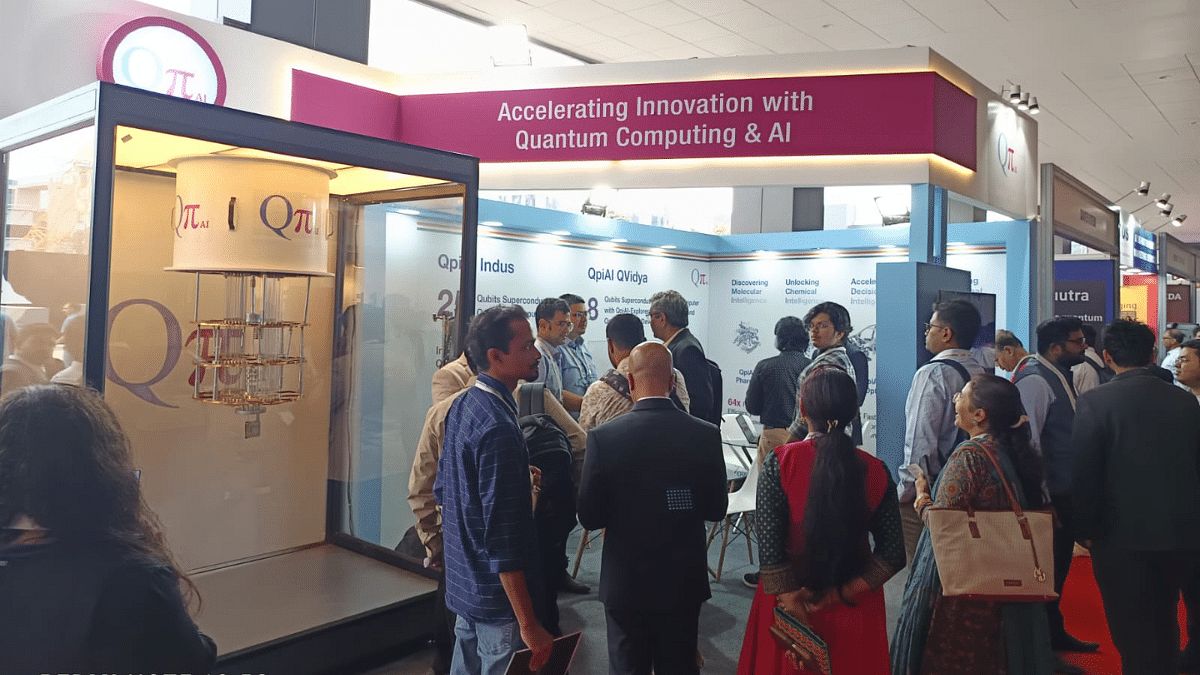 Image Source: The Print
Image Source: The Print
Key Highlights
The Quantum India Bengaluru Summit 2025, held from July 31 to August 1, 2025, emerged as a global confluence of Nobel laureates, scientists, industry pioneers, and startups focused on advancing quantum technologies and their real-world applications, particularly in healthcare and technology innovations.
Karnataka’s government announced major investments and initiatives including the launch of the Karnataka Quantum Mission backed by Rs 1,000 crore, and unveiled the ambitious Quantum City (Q-City) near Bengaluru, envisioned as a comprehensive quantum technology hub integrating research, manufacturing, and advanced data infrastructure.
With over 1,950 delegates from 19 countries attending, the summit reinforced Bengaluru’s positioning as India’s quantum capital and showcased a roadmap titled “Building a Quantum Ecosystem: Qubits to Society,” focusing on translating quantum research into societal benefits.
The event featured cutting-edge demonstrations including quantum sensors for heart monitoring, simulating cancer at the cellular level using quantum computing, and AI-driven quantum analytics for optimizing drug trials and personalized healthcare.
Nobel laureates like David Gross and Duncan Haldane delivered keynote addresses emphasizing the importance of nurturing fundamental scientific discovery alongside industry application, and urged India to build labs, train talent, and foster an ecosystem supporting quantum innovation.
Transforming Healthcare through Quantum Technologies
Experts highlighted the revolutionary potential of quantum computing in healthcare, such as simulating drug interactions within cells to reduce chemotherapy complications and improving clinical trial precision through quantum machine learning.
Quantum sensors featuring ultra-sensitive detection of magnetic fields generated by the human heart promise non-invasive diagnostics without radiation or contrast dyes, opening new frontiers in cardiac care.
The convergence of quantum physics and artificial intelligence was showcased as a driver for predictive, personalized, and safer healthcare solutions, marking a shift from theory to bedside applications.
Building Karnataka’s Quantum Ecosystem
The Karnataka Quantum Mission aims to create a $20 billion quantum economy by 2035, developing advanced quantum processors, fostering over 100 startups, and generating over 200,000 direct jobs in the sector.
Programs include introducing quantum curriculum at higher secondary education levels and establishing a Quantum Technology Task Force to steer policy, infrastructure development, and innovation funding.
The proposed Quantum City is set to mirror Bengaluru’s IT park success by becoming a global hub for integrated quantum chip fabrication, research labs, and specialized industry clusters.
To promote research excellence, the state announced the Pancharatnam Prize honoring contributions bridging fundamental quantum science and practical applications.
Fostering Innovation and Startups
Panels underscored the need for a coherent startup ecosystem to accelerate quantum technologies from lab prototypes to market-ready solutions, with public-private partnerships forming the backbone.
Discussions stressed the role of interdisciplinary collaboration among physicists, engineers, and entrepreneurs to harness quantum potential effectively.
Emphasis was placed on developing talent pipelines, incubation centers, and venture capital networks dedicated to quantum ventures, as well as international collaboration with institutions and platforms like the India Quantum Conclave.
India’s Position in the Global Quantum Race
Speakers like Nobel laureate Duncan Haldane encouraged India not to be spectators but active shapers of quantum technology’s unfolding era, highlighting immediate opportunities in quantum sensing and niche applications beyond large-scale quantum computers.
The summit conveyed urgency for India’s investments in world-class labs, research training, and innovative policies to keep pace with global advancements led by countries like the U.S., China, and European nations.
Karnataka’s proactive approach positions it to capture a significant market share of the global quantum sector, targeted at 20% by 2035, leveraging existing IT and scientific infrastructure.
Future Directions and Broader Impacts
Beyond healthcare, quantum applications in cybersecurity, communication, AI, and material science were discussed as focal research areas with transformative societal impacts.
The summit affirmed Karnataka’s commitment to hosting Quantum India annually, signaling sustained momentum to make quantum technology a core pillar of India’s technological leadership.
Government officials highlighted plans for regular policy updates, collaborative ventures, and integrating quantum innovations into critical infrastructure and public services.
Conclusion
The Quantum India Bengaluru Summit 2025 highlighted the remarkable strides India is making to build a vibrant quantum ecosystem driven by technology innovations, healthcare breakthroughs, and robust government-industry support. With the launch of the Karnataka Quantum Mission and futuristic infrastructure like Quantum City, Karnataka is fast emerging as a global quantum hub. The involvement of Nobel laureates and international experts underscored the importance of fundamental science fueled by curiosity, coupled with market-driven innovation. As quantum technologies edge closer to mainstream applications, India’s strategic investments today promise to reshape not only its economy but also the future of medicine, security, and computing globally.
Sources: Hindustan Times, The New Indian Express
Advertisement
Advertisement




